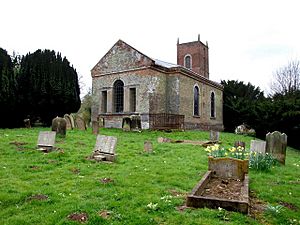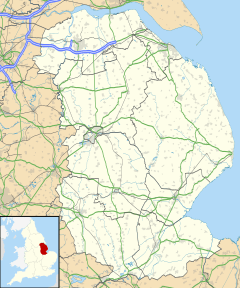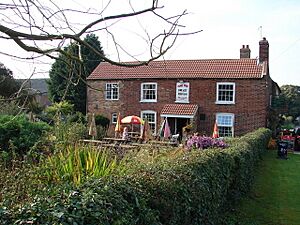South Thoresby facts for kids
Quick facts for kids South Thoresby |
|
|---|---|
 St Andrew's Church, South Thoresby |
|
| Population | 128 ( Including Calceby. 2011) |
| OS grid reference | TF401770 |
| • London | 120 mi (190 km) S |
| Civil parish |
|
| District | |
| Shire county | |
| Region | |
| Country | England |
| Sovereign state | United Kingdom |
| Post town | Alford |
| Postcode district | LN13 |
| Dialling code | 01507 |
| Police | Lincolnshire |
| Fire | Lincolnshire |
| Ambulance | East Midlands |
| EU Parliament | East Midlands |
| UK Parliament |
|
| Website | http://www.south-thoresby.co.uk |
South Thoresby is a small village and civil parish in the East Lindsey area of Lincolnshire, England. It is located about 10 miles (16 km) north-east of Horncastle. The village had a population of 128 people in 2011.
A cool fact about South Thoresby is that the famous band Arctic Monkeys recorded their first album, Whatever People Say I Am, That's What I'm Not, here in 2006.
Exploring South Thoresby's Location
South Thoresby is found in the Lincolnshire Wolds, a beautiful area of rolling hills. It's about 1 mile (1.6 km) east of the A16 highway.
The village's area, called a civil parish, stretches south. It includes small places like Calceby and Driby. Haugh is to the south-west. The village is also close to Aby with Greenfield in the north.
Life in South Thoresby
The local parish council helps manage Swaby, South Thoresby, and Haugh. These are all separate civil parishes.
South Thoresby's church is named after Saint Andrew. It was built in 1738 and fixed up in 1872. This church replaced an older one that was no longer used by 1735.
The village's local pub is called the Vine Inn. It was first built in 1508, making it very old! The building you see today seems to be from the 1700s.
There is also a chalk quarry in the parish called Singleton Birch.
South Thoresby Warren Nature Reserve
The South Thoresby Warren nature reserve opened in 2007. It was officially named a Local Nature Reserve in 2008. This means it's a special place to protect nature.
Many birds can be seen here, including the yellowhammer, bullfinches, great tits, and buzzards. You can also find various plants like the common spotted orchid and the Yorkshire fog. Other plants include the common mouse-ear and the bristly ox-tongue. You might also spot the silverweed, the self-heal, and the common centaury.
 | Stephanie Wilson |
 | Charles Bolden |
 | Ronald McNair |
 | Frederick D. Gregory |



